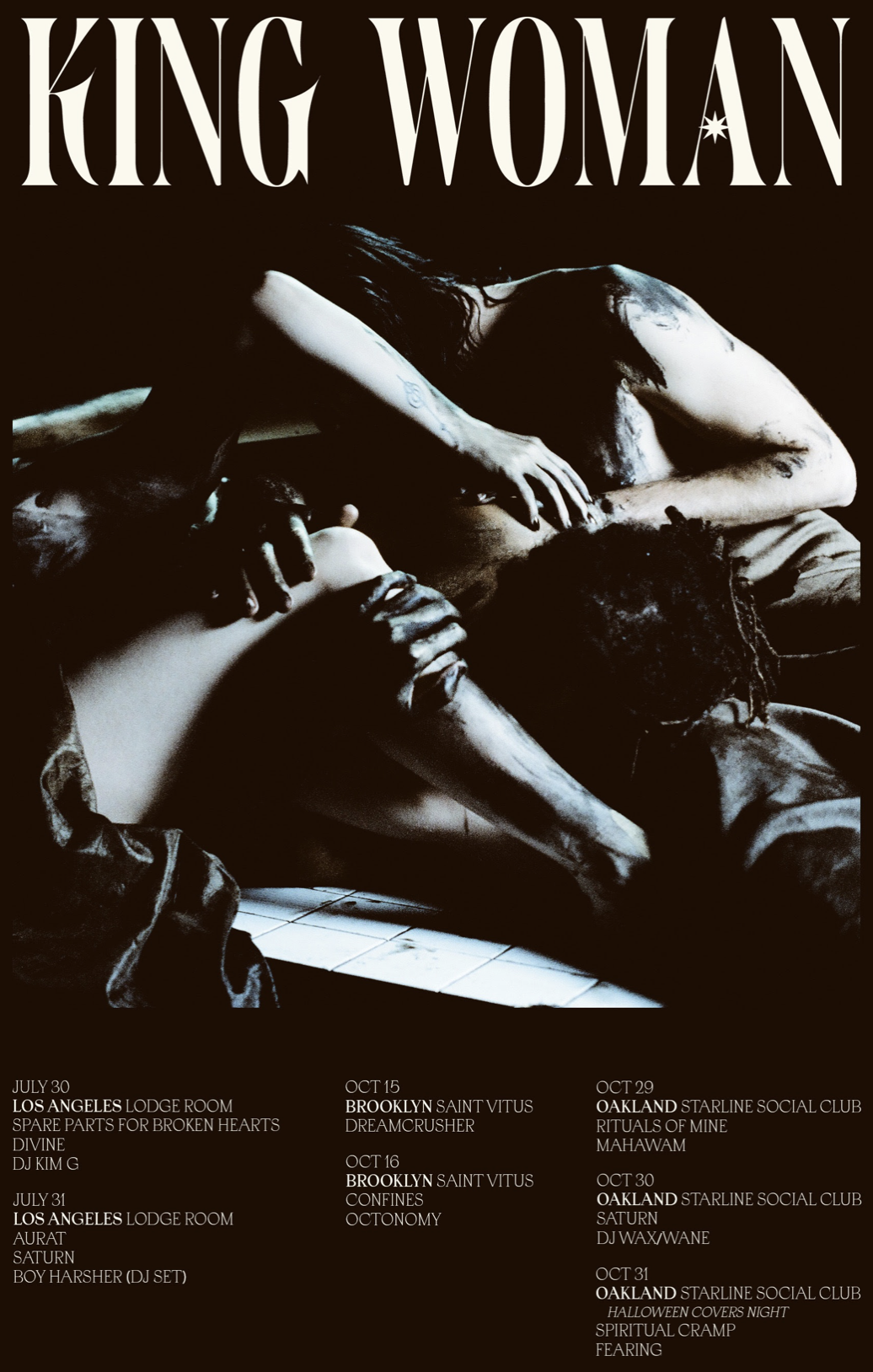Celestial Blues: A Conversation with Kris Esfandiari - The Voice behind KING WOMAN
For Kris Esfandiari, the concept of Lucifer is not something to shy from, it is a source of inspiration, a conduit for her creativity and expression. It’s the darkness that is relatable, a necessary quality that makes us all the more human. With the new album Celestial Blues, Esfandiari and her band King Woman have created a heavy sonic experience that is heartfelt, forceful, filled with enigmatic and mysterious imagery.
Esfandiari’s latest videos “Psychic Wound” and “Morningstar”, released now on Relapse Records, showcase her talents, not just as a musician but also her skills in visual creation and art direction. The videos are self-contained dark tales, littered with cryptic and subtle imagery, that accentuate the themes of the new album. Broken wings, blood and ritualistic-like altars; the videos are a sensory shock to the system that demand repeat viewings.
To delve into the genesis of this special album, GATA had the chance to talk with the KING WOMAN about the creative influence that Milton’s Paradise Lost had on the music, as well as her ongoing appreciation for the cinema of Wong Kar-wai.
Kris Esfandiari by Nedda Afsari
First of all congratulations on the new album Celestial Blues, you should be really proud of creating this beautiful piece of art. Could you please introduce yourself to the GATA family?
You’re so sweet. Thanks! I’m Kris Esfandiari. I’m an Iranian songwriter, producer, creative director, performer, etc.
I have ten different musical projects. I live in NY.
Could you tell us, when and why you took your first steps into the world of music?
As a teenager I was pushed into the world of music when I started singing at church. A few years later people started buying me guitars out of the blue saying I should pursue music. I took it as a sign. When I wrote my first song it came out effortlessly. My life made sense when I connected with songwriting and music so I kept rolling with it.
“The mind is its own place, and in itself can make a heaven of hell, a hell of heaven.”
Your new album Celestial Blues contains moments of sensitivity mixed alongside aggression and harsh sounds, you walk a fine line between these elements, balancing them perfectly; are there ever moments in which you find it difficult to find a balance between the “light” and the “darkness”?
I try to keep the focus on what interests me rather than a balance of light and dark. I typically feel more inclined towards seemingly dark things but who knows? Maybe that will change with my next album.
The song “Morning Star” from the new album references the story of “Lucifer” and his fall from grace, why is “Lucifer” so important to you?
I felt compelled to embody this specific archetype for reasons beyond my understanding. I generally create off of my instincts and don’t fully grasp what I am creating until after the fact.
I suppose I went on a journey with a menacing yet illuminating character who became a part of me and wanted to express itself through me in a specific way.
“Whatever it is, the way you tell your story online can make all the difference.Celestial Blues was the final stage in my healing process. I felt the need to sing about things / act out characters in order to understand and release them.”
You have mentioned in the past the influence of John Milton’s Paradise Lost on your music, is there a particular passage that resonated with you?
“The mind is its own place, and in itself can make a heaven of hell, a hell of heaven.”
In 2015, King Woman released the EP “Doubt”, which was influenced by your experiences of trying to leave behind your strict religious upbringing, yet there seems to still be strong religious themes and imagery in your lyrics; I was wondering if you could explain a little bit more about your feelings towards religion and spirituality as a whole?
It’s complex. Celestial Blues was the final stage in my healing process. I felt the need to sing about things / act out characters in order to understand and release them. The archetypes from the Bible will always fascinate me. I’m not particularly religious anymore. I prefer not to speak on my spiritual practices.
Kris Esfandiari by Nedda Afsari
The visual side of your videos is very strong and striking, what influences your particular aesthetic?
My own imagination, bizarre dreams I have, my relationships with other people, childhood experiences.
As a child, I was lost in my own world and had a very vivid imagination which made it hard to connect with the outside world. I suppose the same is true today, I’ve just learned how to mask it a little bit more effectively. Oftentimes when I write a song and listen back I can see what the visuals should be almost immediately. It’s easy for me.
You have stated in the past that “art direction” is an important part of your creativity, what is the appeal of this form of creation for you and how does it differ from your feelings and process with music?
Attention spans have grown short with the times. It’s rare that anyone will pay attention to your music if you pair it with visuals that aren’t just as striking. The challenge of having to pick a set of visuals to represent an album feels exciting to me. It can truly make or break a release.
“I want to ascend until we collide. I want to crash my heart into the divine.”
Your cover of “I Wanna Be Adored” is amazing, you guys created a huge sound that really showed a new side to this classic song. Are there any other bands that influenced you growing up, that you’d love to cover in the future?
Thanks so much. I was pretty surprised at how well-received it was. I’m doing a series of covers in the near future, but no artists that I listened to growing up. I suppose I listened to a lot of Neil Young with my dad as a kid, but wouldn’t attempt to cover one of his songs.
We know that you are very attracted to Japan, could you tell us a little bit about your connection with the country, and where that interest comes from?
It started when I was a kid. In school, they had these books with photos of Japan and I had never travelled outside of California. I saw some photos of Tokyo and thought “One day I’m going to go there and love it!” As an adult, I fell in love with Japanese films, music, fashion. Love Japanese food as well.
I was planning on celebrating this release by being in Tokyo but COVID restrictions have made that nearly impossible.
For GATA the art of cinema is really important to us, are there any films that have really touched you and helped shape your identity?
Absolutely. Fallen Angels is my favourite film. I usually have something by Wong Kar-wai playing in the background when I’m working on music. I also love this cute movie How to Talk to Girls at Parties by John Cameron Mitchell. Don’t think it did very well but I thought it was adorable. Also, love Hedwig as well.







